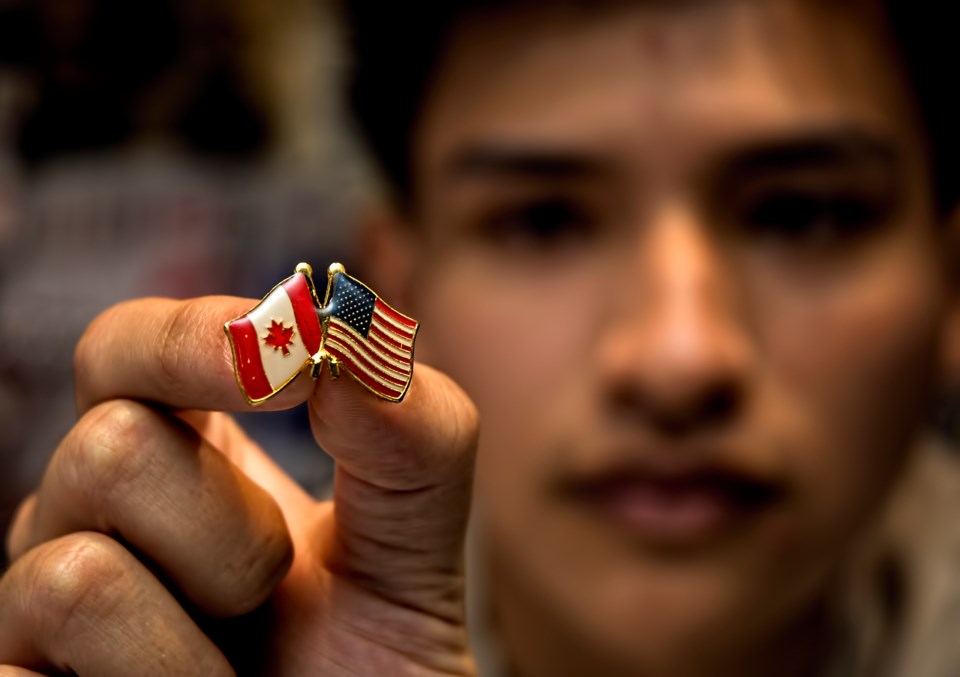B.C. and Canada are attempting to reorientate trade in the wake of U.S. tariff threats and trade action, but meaningfully shifting away from reliance on the U.S. economy is unlikely, says one expert.
“Geography is destiny when it comes to international trade,” says Werner Antweiler, associate professor at the University of British Columbia’s Sauder School of Business.
He said Canada’s reorientation of trade with the U.S. will not be a political decision—rather, it will be a market decision driven by relative prices.
Partly due to geography, B.C. relies heavily on trade with the U.S. and Asia.
According to a March 26 provincial trade overview by BC Stats, the province exported a total of $54.5 billion worth of physical goods in 2024. A total of $28.7 billion or around 52.8 per cent of these exports went to the U.S.
Mainland China received 15.6 per cent of B.C.’s exports, followed by Japan at 10.4 per cent.
The source of B.C.’s imports painted a similar picture, bringing in $25.2 billion worth of physical goods in 2024 from the U.S.—accounting for 34.5 per cent of imports. China followed with 24 per cent and Japan sat in third place with 6.1 per cent.
On a national scale, Antweiler said he doesn’t foresee much of a shift on imports. He said a reorientation of Canadian exports overseas could also be challenging due to numerous factors.
One of these factors is higher transportation costs, as well as the saturation of some products in foreign markets. Selling Canadian cars in Europe instead of the U.S. would be challenging, said Antweiler.
“The idea that we can pivot away from the United States is very questionable for many industries … proximity is essential,” he said. “Eventually, we need to find a way back to free trade in North America. There is no other way for us to prosper because all these other markets are, in most instances, too far away.”
According to Antweiler, diversifying some of B.C.’s trading could be beneficial, but diversifying it too much might not be.
When it comes to exporting more LNG to the Asian markets, he said the province is diversifying its exports, but that they might be trading one risky market for another.
“The U.S., … they were always reliable for the last eight decades or so, it’s still the ideal market. Trump is the anomaly here,” he said. “The idea to reduce risk only works to the extent that you’re dealing with less risky partners.”
This is something that should be thought of more carefully, said Antweiler.
Renegotiation with the U.S. inevitable for next administration
“Canada … the most European of non-European countries,” said Canadian Prime Minister Mark Carney next to French President Emmanuel Macron on March 17. That same day, Carney travelled north to the U.K. to meet with Prime Minister Keir Starmer and King Charles.
Two days prior, a statement by Carney in a release said the trip would bolster trade, commercial and defence ties with two of Canada’s strongest and most reliable partners.
The new leader of Canada’s Liberal Party picked Europe as his first overseas trip instead of the U.S.—a clear message to President Donald Trump amid trade tension between both nations.
“The old relationship we had with the United States … is over,” said Carney at a March 27 cabinet meeting in Ottawa.
According to an April 1 Research Co. survey, data shows that many Canadians support exploring trade partnerships elsewhere.
Among the 1,001 adults surveyed across Canada, 87 per cent of British Columbians believe in enhancing trade with Australia and New Zealand, up by one point since February.
This is followed by Japan with 85 per cent, up one point, and the European Union at 84 per cent. Mexico sat at fourth spot with 82 per cent, three points down since February.
In contrast, Conservative Party leader Pierre Poilievre made remarks on April 2 saying that on day one as prime minister, he would propose accelerating Canada-U.S. negotiations and replace the Canada-United States-Mexico agreement, to bring in a new deal on trade and security.
“CUSMA must be renegotiated next year regardless. Why wait?” said Poilievre. “Why not end the uncertainty that is paralyzing both sides of the border… and I will propose that both countries pause tariffs while we hammer out that deal.”
The Research Co. survey also showed that 43 per cent of British Columbians think a Conservative federal government would be better positioned at this point to deal with the tariffs—up one point since February.
Despite contrasting approaches ahead of the April 28 federal elections, there is no way around negotiating with the U.S., said Antweiler. However, he added Canada should not be intimidated or coerced into annexation by the White House.
“What does the United States really want from us?” said Antweiler. “If it’s really stealing our manufacturing jobs, good luck, because it’s not working the way Mr. Trump thinks it works.”
He explained that jobs are so integrated across the border in sectors like the auto industry, that if jobs are killed on one side, it will lead to jobs being killed on the other—shrinking, and not relocating, industry.
“There’s no way for Trump’s policy to succeed,” he said. “And because it can’t, economically, there’s really no way to a resolution other than the U.S. dialing down its attempt to strong-arm our economy.”



